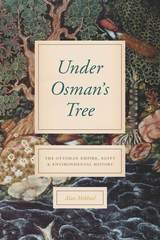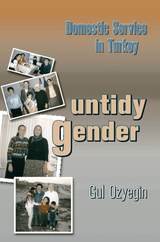181 books about Turkey and 3
start with U
181 books about Turkey and 3
181 books about Turkey
3 start with U start with U
3 start with U start with U

Under Osman's Tree
The Ottoman Empire, Egypt, and Environmental History
Alan Mikhail
University of Chicago Press, 2017
Osman, the founder of the Ottoman Empire, had a dream in which a tree sprouted from his navel. As the tree grew, its shade covered the earth; as Osman’s empire grew, it, too, covered the earth. This is the most widely accepted foundation myth of the longest-lasting empire in the history of Islam, and offers a telling clue to its unique legacy. Underlying every aspect of the Ottoman Empire’s epic history—from its founding around 1300 to its end in the twentieth century—is its successful management of natural resources. Under Osman’s Tree analyzes this rich environmental history to understand the most remarkable qualities of the Ottoman Empire—its longevity, politics, economy, and society.
The early modern Middle East was the world’s most crucial zone of connection and interaction. Accordingly, the Ottoman Empire’s many varied environments affected and were affected by global trade, climate, and disease. From down in the mud of Egypt’s canals to up in the treetops of Anatolia, Alan Mikhail tackles major aspects of the Middle East’s environmental history: natural resource management, climate, human and animal labor, energy, water control, disease, and politics. He also points to some of the ways in which the region’s dominant religious tradition, Islam, has understood and related to the natural world. Marrying environmental and Ottoman history, Under Osman’s Tree offers a bold new interpretation of the past five hundred years of Middle Eastern history.
The early modern Middle East was the world’s most crucial zone of connection and interaction. Accordingly, the Ottoman Empire’s many varied environments affected and were affected by global trade, climate, and disease. From down in the mud of Egypt’s canals to up in the treetops of Anatolia, Alan Mikhail tackles major aspects of the Middle East’s environmental history: natural resource management, climate, human and animal labor, energy, water control, disease, and politics. He also points to some of the ways in which the region’s dominant religious tradition, Islam, has understood and related to the natural world. Marrying environmental and Ottoman history, Under Osman’s Tree offers a bold new interpretation of the past five hundred years of Middle Eastern history.
[more]

The United States and the Armenian Genocide
History, Memory, Politics
Julien Zarifian
Rutgers University Press, 2024
During the first World War, over a million Armenians were killed as Ottoman Turks embarked on a bloody campaign of ethnic cleansing. Scholars have long described these massacres as genocide, one of Hitler’s prime inspirations for the Holocaust, yet the United States did not officially recognize the Armenian Genocide until 2021.
This is the first book to examine how and why the United States refused to acknowledge the Armenian Genocide until the early 2020s. Although the American government expressed sympathy towards the plight of the Armenians in the 1910s and 1920s, historian Julien Zarifian explores how, from the 1960s, a set of geopolitical and institutional factors soon led the United States to adopt a policy of genocide non-recognition which it would cling to for over fifty years, through Republican and Democratic administrations alike. He describes the forces on each side of this issue: activists from the US Armenian diaspora and their allies, challenging Cold War statesmen worried about alienating NATO ally Turkey and dealing with a widespread American reluctance to directly confront the horrors of the past. Drawing from congressional records, rare newspapers, and interviews with lobbyists and decision-makers, he reveals how genocide recognition became such a complex, politically sensitive issue.
This is the first book to examine how and why the United States refused to acknowledge the Armenian Genocide until the early 2020s. Although the American government expressed sympathy towards the plight of the Armenians in the 1910s and 1920s, historian Julien Zarifian explores how, from the 1960s, a set of geopolitical and institutional factors soon led the United States to adopt a policy of genocide non-recognition which it would cling to for over fifty years, through Republican and Democratic administrations alike. He describes the forces on each side of this issue: activists from the US Armenian diaspora and their allies, challenging Cold War statesmen worried about alienating NATO ally Turkey and dealing with a widespread American reluctance to directly confront the horrors of the past. Drawing from congressional records, rare newspapers, and interviews with lobbyists and decision-makers, he reveals how genocide recognition became such a complex, politically sensitive issue.
[more]

Untidy Gender
Domestic Service in Turkey
Gul Ozyegin
Temple University Press, 2000
"A sophisticated and sensitive text on domestic service in Turkey that singles itself out by a powerful account of the micro-sociology of power. It engages the reader in much broader debates about the mutual relations of class and gender, the role of patriarchal controls in shaping informal female labor markets and the management of status differentials by women in their daily lives. An important scholarly contribution written in a lucid and accessible style."
--Deniz Kandiyoti, School of Oriental and African Studies, University of London
Untidy Gender takes readers into the interconnected worlds of Turkish maids and the women who employ them, tracing the incorporation of rural migrant women into the interiors of the domestic spheres of the urban middle-classes. Firmly grounded in data collected through a representative survey of 160 domestic workers, in-depth interviews, and participant observation in the kinship-based communities of domestic workers, this book forges a new understanding of the complex interaction between gender and class subordination.
Ozyegin traces the lives of two kinds of workers; those from the squatter settlements who work in a number of locations, and those who live with husbands employed as "doorkeepers" or building superintendents in the basements of middle-class apartment buildings. In a literal "upstairs, downstairs" arrangement, the latter women sometimes take on apartment cleaning for clients in the building.
At the center of the book are a number of ironies about patriarchy. On the surface, husbands have absolute control over whether or not their wives work, but some women work in secret, and those "doorkeeper" husbands who allow their wives to work often provide child care themselves. Ironically, the very constraints on the spatial and social mobility of the women creates a labor market in which domestic workers' labor is expensive and not readily forthcoming, which, in turn, gives them a degree of power in negotiating their relationship with their middle-class employers.
Untidy Gender offers insights not only into the gender and class dynamics of Turkish society, but contributes to the refinement of central terms of feminist scholarship and research on work in the informal sector, cross-class relations between women, gender and class inequality, and women's experiences of modernity and urbanization. The author ends with a personal account of her own difficulties with the class tensions of the maid-employer relationship.
"Untidy Gender makes contributions to a large number of debates in several social science fields and sub-fields. And it does so on an extraordinarily sound methodological base: Ozyegin was able to construct a random sample for her 'women in the basement.' This is the gold standard of research, and may be unique in the research annals of studies of domestic workers."
--Rae Lesser Blumberg, William R. Kenan, Jr. Professor of Sociology, University of Virginia
"This original book sheds new light on the dynamics of modernity and newly constituted urban identities. Through a careful ethnographic study of paid domestic work, Ozyegin illuminates the varied ways in which relations of class and gender inequalities are shaped and maintained. American audiences interested in rural-urban migrants, in intersectionalities of race, class, and gender, and in identities, power, and resistance in the workplace will find some of the most compelling ethnography and many valuable theoretical nuggets in this book."
--Pierrette Hondagneu-Sotelo, Associate Professor, Department of Sociology, University of Southern California
"Ozyegin presents a cutting-edge analysis of the complexities of modernization by focusing on gender relations. While avoiding numerous rhetorical traps around questions of 'difference' Ozyegin seamlessly weaves together a thoughtfully articulated theory with a meticulous empirical analysis of patriarchal and class relations among modern urban women and more traditional migrant women living at the margins of modernity. Given its significant substantive and theoretical contributions, I will look forward to teaching Untidy Gender in my courses."
--Judith M. Gerson, Associate Professor, Departments of Sociology and Women's Studies, Rutgers University, New Brunswick
[more]
READERS
Browse our collection.
PUBLISHERS
See BiblioVault's publisher services.
STUDENT SERVICES
Files for college accessibility offices.
UChicago Accessibility Resources
home | accessibility | search | about | contact us
BiblioVault ® 2001 - 2024
The University of Chicago Press









